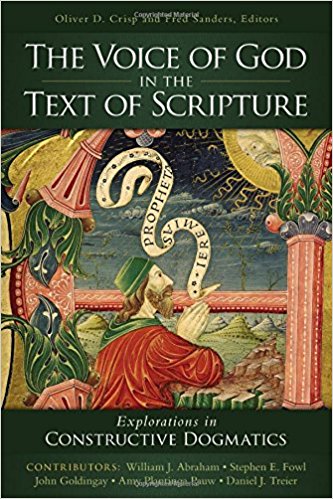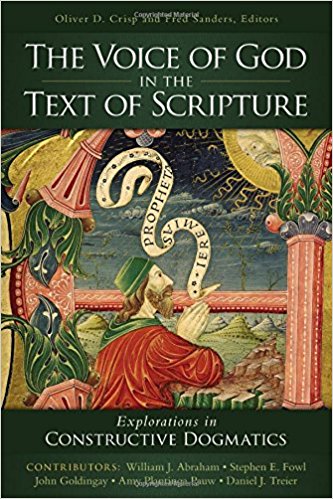The Voice of God in the Text of Scripture: Explorations in Constructive Dogmatics

A Denver Journal Book Review by Denver Seminary Mentoring Director Dan Steiner

Oliver D. Crisp and Fred Sanders, eds. The Voice of God in the Text of Scripture: Explorations in Constructive Dogmatics. Grand Rapids: Zondervan, 2016. $29.99. Paperback, 196 pp. ISBN 9780310527763.
How should the people of God today hear, understand, and respond to the voice of God speaking through the words of Scripture written thousands of years ago? This is the big question asked and answered in The Voice of God in the Text of Scripture: Explorations in Constructive Dogmatics, edited by Oliver D. Crisp and Fred Sanders. Since God is the ultimate author of Scripture, inspiring its human authors by means of the Holy Spirit, how are we to understand what it means to grow our ability to listen, to know the mind of God through literary devices such as metaphors, and to recognize cultural particularities both past and present? This book both provides insight into topics such as these, while also whetting the appetite of the more serious student who wants to dig deeper into the explored subjects.
Each chapter of this book began as a paper presented by different scholars at the 2016 Los Angeles Theology Conference. One of the distinctive features of this particular work is interdisciplinary collaboration. Systematic theologians, Biblical studies scholars, and philosophers each approached their individual piece of the conversation through the lens of their own particular discipline. The result is a well-rounded and thoughtful work, which challenges scholars, pastors, and laypersons alike to consider what it means to hear the voice of God through the text of Scripture.
Daniel Treier begins by proposing a three-part dogmatic framework for hearing God’s voice in Scripture: a commitment to honoring the Church’s tradition, a recognition of pastoral and intellectual trends found within contemporary contexts, and an understanding of how God has revealed Himself to us in a textual manner. Whether it was intended or not, it is from this third part of Treier’s dogmatic framework that the rest of the book’s chapters launch as each focuses upon a particular aspect of Scripture’s textual communication. Rather than provide an overview of each chapter, I will simply highlight three of the chapters covered in the remainder of the book.
The first is Stephen Fowl’s contribution, which shows how the book of Hebrews provides a useful study regarding how we are to hear God’s spoken voice. The first two verses of Hebrews indicate a varied nature to God’s revealed voice prior to and through the incarnation. However, rather than focus only on the ways in which God has spoken, Fowl turns the coin around and considers what it means for the people of God to listen to and hear God’s voice. The goal of this listening is not simply an acquired knowledge, but rather it is an intentional formation of the listener to be a mature hearer of God’s voice. Fowl goes on to advocate for theological institutions to focus not only on producing “technically accomplished interpreters of Scripture” (57), but also to produce mature hearers of the text who have a disposition of wisdom and theological discernment to accompany their technical interpretive skills. This poses an interesting question regarding what it might look like to equip men and women within academic institutions for this sort of listening to and hearing of the text.
Erin Heim explores the use and understanding of metaphor within the text of Scripture. She proposes that God is a “Metaphor-Maker” who “invites the audience of Scripture to enter into a ‘sameness of vision’ and to share in the divine perspective presented in the text” (113). In essence, Metaphors within Scripture are more than merely aesthetic; they are lenses through which the Author invites the reader to see a particular subject. Instead of being subjective in nature, metaphors have an objective reality as intended by the Author. That is not to say that every metaphor has a literal meaning, but that proper work needs to happen in order to discover what God Himself intends to communicate through a particular metaphor within a particular passage within scripture. An encounter with a metaphor in Scripture is an encounter with the mind of God. The use of metaphor allows abstract truths to take root in the ground floor reality of life. The insights Heim provides regarding the use of metaphor in Scripture emphasize the beauty of God’s written revelation and allow us to know in a more tangible way the very mind of God.
Daniel Lee’s chapter is entitled, “Reading Scripture in Our Context: Double Particularity in Karl Barth’s Actualistic View of Scripture.” While the title itself may be a mouthful, the main point Lee communicates is actually very simple and greatly needed in order to hear God’s voice in Scripture today. In essence, there is a “scriptural particularity of there and then, and our particularity of here and now and the living Jesus who is present in both” (166). The context within which Scripture was written significantly factors into how a person reads, interprets and understands the text. So too does the context within which the reader finds him or herself in as they read the text. God’s voice spoke long ago and God’s voice is still speaking today, and somehow His voice is the same today as it was thousands of years ago. Lee points out that Barth connected these two realities Christologically and that it is Christ Himself “who unifies the past and the present” (171). While this may seem to be a technical way of simply saying “context matters,” Lee provides some important insight into how the context of written Scripture and the context we find ourselves in today are connected. The context of the Scriptural there and then will never change (though our understanding of it may grow), but the context of our here and now will always be adjusting. This same concept can be helpful in understanding how doctrine has developed over the centuries and will continue to develop in the future.
While I cannot give a comprehensive review of the other six chapters, I hope what I have shared might create a desire to explore the rest of this book. Depending on a person’s particular area of expertise or interest, some chapters may resonate more than others may. It is for this very reason, though, that this book makes for a wonderful resource. It allows each student of Scripture to think about and be sharpened by those outside of their particular discipline as they grow in their understanding of and ability to hear and respond to God’s voice in text of Scripture.
Dan Steiner
Mentoring Director
Denver Seminary
May 2017
